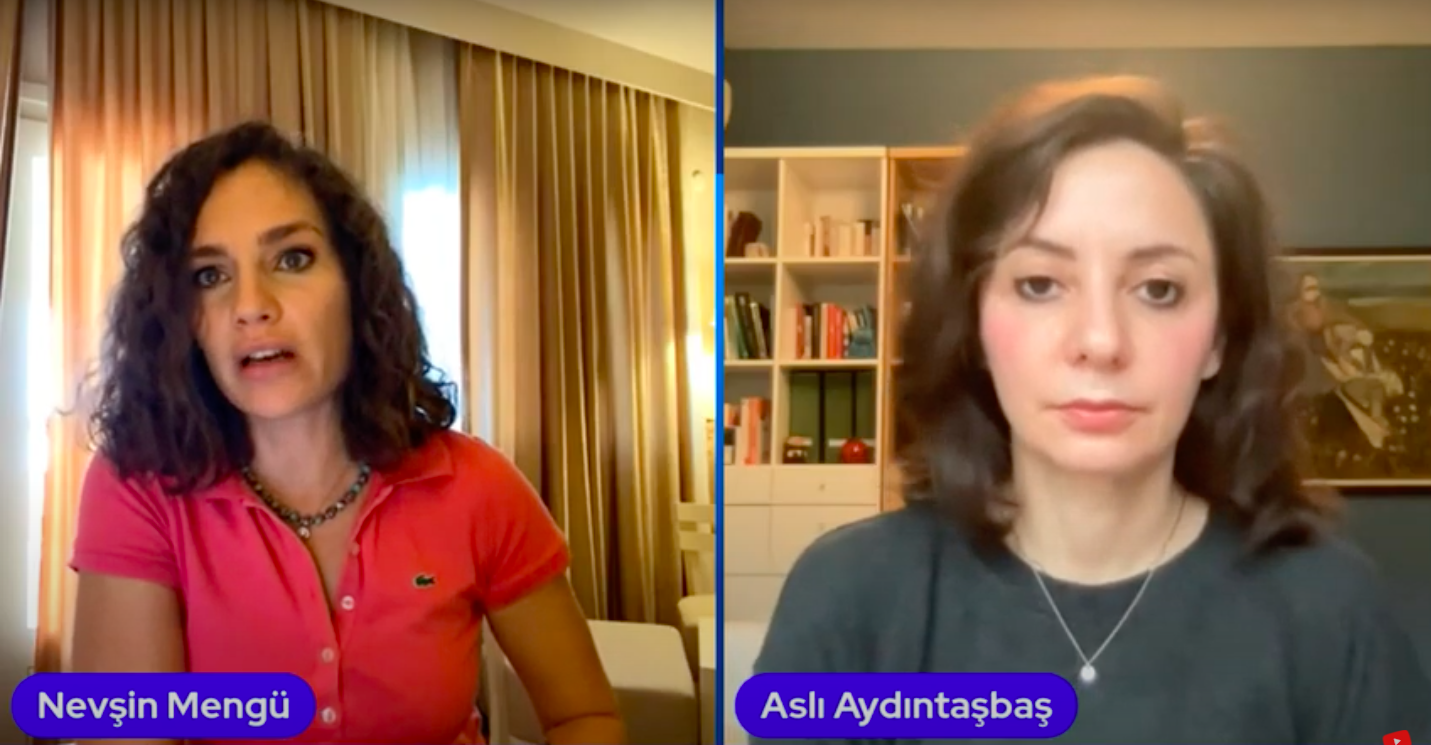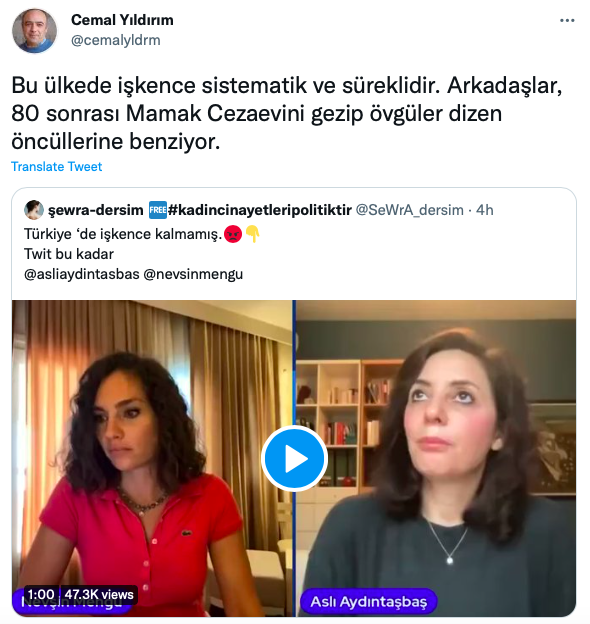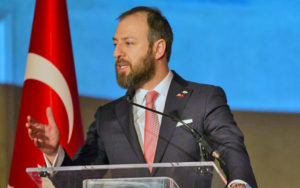Levent Kenez/Stockholm
A journalist and fellow at a European-based think tank surprisingly has claimed that systematic torture no longer takes place in Turkey as in the past and that this is thanks to the West.
Aslı Aydıntaşbaş, a Turkish journalist who has been working at the European Council on Foreign Relations (ECFR), a think tank led by notable figures in European politics, on Sunday joined Turkish journalist Nevşin Mengü’s YouTube program, commenting on the call made by 10 ambassadors in Turkey for the release of jailed human rights activist Osman Kavala and Turkish President Recep Tayyip Erdoğan’s reaction to it.

Aydıntaşbaş supported the ambassadors’ statement and said positive developments regarding democracy and freedom of thought in the past in Turkey were thanks to the West, citing the alleged current absence of systematic torture in Turkey as an example.
“When I started in journalism, there was a big question about torture. The ‘fight against torture’ always came up at press conferences. There were constant warnings about this from the West. There is ill-treatment and individual cases, but today there is no longer any systematic torture. This is largely thanks to our communication with the West and our involvement in the Western system,” she said.
However, the reports of international bodies and human rights organizations do not confirm Aydıntaşbaş’s statement. For instance, the “Turkey 2021 Report” released by the European Commission expresses the EU’s concern about torture in Turkey and emphasizes that Turkey must fulfill its international obligations as regards torture and ill treatment. The report states that torture and ill-treatment still occur in detention centers, prisons and informal places of detention as well as on the streets, mostly during demonstrations and meetings. The commission report also reminded that publication of the 2016 report of the Council of Europe’s Committee for the Prevention of Torture (CPT) was not authorized by Turkish authorities
Nordic Monitor last year recounted the story of a man who had spoken to the CPT, whose report Turkey has blocked for five years. Brutally tortured, robbed of his property and livelihood, imprisoned and his family stigmatized, a colonel and his story represent the epitome of suffering caused by human rights abuses committed on a massive scale in post-coup Turkey. He was one of the victims of systematic torture who gave a statement to the visiting members of the European Committee for the Prevention of Torture and Inhuman or Degrading Treatment or Punishment (CPT).
In 2018 the Office of the United Nations High Commissioner for Human Rights (OHCHR) exposed systematic torture in Turkey following an abortive coup in 2016. In a 28-page report, OHCHR documented the use of different forms of torture and ill-treatment for people in custody, including severe beatings, threats of sexual assault and actual sexual assault, electric shocks and waterboarding. Based on accounts collected by OHCHR, the acts of torture and ill-treatment generally appeared aimed at extracting confessions or forcing detainees to denounce other individuals. It was also reported that many of the detainees retracted forced confessions during court appearances.
In its World Report 2020, Human Rights Watch stated: “A rise in allegations of torture, ill-treatment and cruel and inhuman or degrading treatment in police custody and prison over the past four years has set back Turkey’s earlier progress in this area. Those targeted include Kurds, leftists, and alleged followers of Fethullah Gulen. Prosecutors do not conduct meaningful investigations into such allegations and there is a pervasive culture of impunity for members of the security forces and public officials implicated.”
The “2020 Country Reports on Human Rights Practices: Turkey” released by the US Department of State mentions significant human rights issues:
“… reports of arbitrary killings; suspicious deaths of persons in custody; forced disappearances; torture; arbitrary arrest and continued detention of tens of thousands of persons, including opposition politicians and former members of parliament, lawyers, journalists, human rights activists, and employees of the U.S. Mission, for purported ties to ‘terrorist’ groups or peaceful legitimate speech; the existence of political prisoners, including elected officials; politically motivated reprisal against individuals located outside the country; significant problems with judicial independence; severe restrictions on freedom of expression, the press, and the internet, including violence and threats of violence against journalists, closure of media outlets, and unjustified arrests or criminal prosecution of journalists and others for criticizing government policies or officials, censorship, site blocking and the existence of criminal libel laws; severe restriction of freedoms of assembly, association, and movement; some cases of refoulement of refugees; and violence against women and lesbian, gay, bisexual, transgender, and intersex persons and members of other minorities.”
Last September, Eric Sottas of Switzerland, the former secretary-general of the World Organization against Torture (OMCT), presented a report titled “Torture in Turkey Today,” which he prepared in cooperation with Prof. Dr. Johan Vande Lanotte at the Turkey Tribunal, a civil society-led, symbolic international tribunal established to adjudicate recent human rights violations in Turkey.
“[Exact] numbers for torture are unknown. The numbers are not known because victims do not file complaints. The reason why the victims do not file complaints is to avoid being tortured again,” Sottas said during his presentation. “We can say that torture is carried out systematically in Turkey and that the perpetrators remain unpunished,” Sottas stated.

Many social media users reacted to Aydıntaşbaş’s statement, accusing secular and “white” Turks of not taking the torture of Kurds and Gülen sympathizers seriously. Cemal Yıldırım, who was tortured in prison after a military coup in 1980 and was unfairly fired by the Turkish government in 2016 along with thousands of other civil servants, likened Aydıntaşbaş on Twitter to pro-military journalists who visited prisons in the 1980s and reported that everything was fine.
The ECFR has a council comprising 330 members from across Europe. It is co-chaired by Carl Bildt, a former prime minister of Sweden and close associate of President Erdoğan.
The Turkish members of the council are controversial figures. For example, Erdoğan’s spokesman İbrahim Kalin, who many believe is responsible for human rights violations in Turkey, is a member of the council. Former prime minister Ahmed Davutoğlu, who ordered the disproportionate military operations against Kurdish provinces between 2015 and 2016, is also a member. Hanzade Doğan, daughter of former media tycoon Aydın Doğan, a staunch supporter of the Erdoğan regime, is also among the members.

Long-time member Ekim Alptekin, a pro-government Turkish businessman whose payments to former National Security Advisor Michael Flynn for research and lobbying work against the Gülen movement, was central to a political controversy in the US. In 2018 he was charged with hiring Michael Flynn as part of a secret, illegal US lobbying scheme on behalf of the Turkish government during and after the 2016 presidential campaign and is still at large. It seems that he was removed from membership after the allegations against him.
Alptekin is the ex-husband of Aydıntaşbaş.












